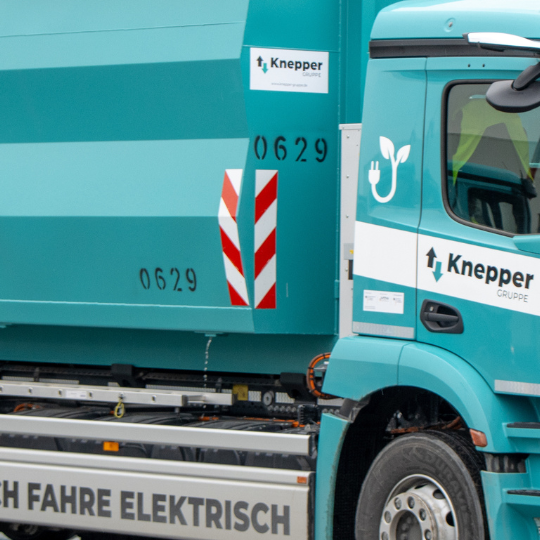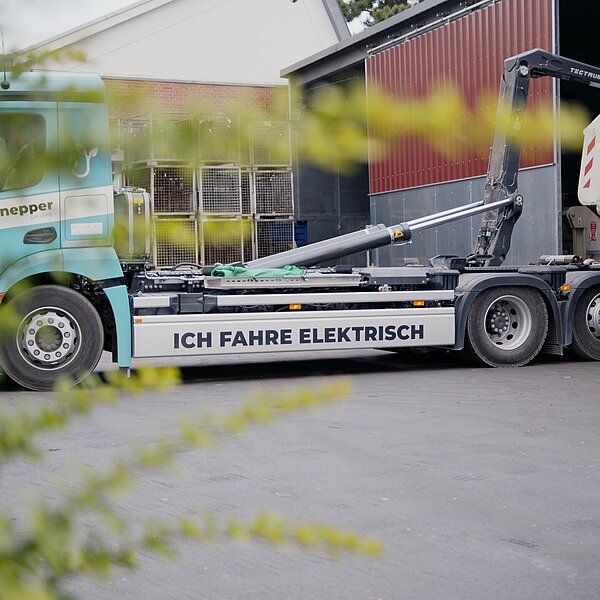Sustainable logistics with the e-Actros 400
The Knepper Group has decided to invest in electromobility and has recently started using the all-electric eActros 400 from Mercedes-Benz Trucks in its fleet. This decision marks a significant step towards sustainable and future-oriented logistics. By opting for the eActros 400, we are positioning ourselves as a pioneer in the region and demonstrating how modern technology can be effectively integrated into day-to-day operations.
Strategic decision
for the future
The decision to opt for the eActros 400 was not taken lightly. Our experts carefully weighed up the various options and ultimately opted for the all-electric truck. Stefan Andermahr, Project Manager and Sustainability Manager at Knepper, explains: "We wanted to promote new technologies and test them in use. Sustainability and the reduction of CO₂ emissions are important factors for us. The eActros also offers us the opportunity to put a real alternative to conventional combustion engines on the road and gain our own experience." this makes us one of the first companies in the Soest district to already have an eActros in operation.
Integration into day-to-day operations
The integration of the eActros 400 into daily operations went smoothly. The truck is mainly used for the distribution of containers and for short distances. The area of operation extends from Lippstadt to the surrounding towns and municipalities such as Langenberg, Erwitte, Anröchte, Geseke, Salzkotten and Soest. Empty containers are delivered to customers and full containers are collected. The emission-free and low-noise operation in particular is seen as a major advantage by many towns and municipalities.
Peter Adams, Head of Logistics at the Knepper Group, sums up the performance of the "newcomer" in the fleet: "The battery of the eActros 400 lasts so long that it arrives at the yard with 20 to 30 percent charge remaining after a day's use. This means that the eActros 400 could probably even be used in two-shift operation." This endurance and efficiency of the eActros 400 make it a valuable asset in daily logistics operations and also an ideal partner for logistics in city centers."
Not only environmentally friendly,
but also economically
The decision to opt for the eActros 400 also made economic sense. The use of electric trucks eliminates toll charges, which saves around 25 euros a day. In the long term, this saving can amount to a considerable sum. In addition, regenerative braking, or recuperation, which recovers energy while reducing wear on the brakes, significantly reduces maintenance costs.
The operating costs of the eActros 400 are lower compared to diesel trucks, as electricity is cheaper than diesel. The charging infrastructure consists of a mobile rapid charging station: "We have purchased a mobile charging station, as charging must be guaranteed at our depot. If there are more e-trucks over time, we are flexible with the mobile charging station and can set up our own charging park in the long term," adds Andermahr.
This strategic approach to alternative drive technologies is complemented by our plans to set up a hydrogen filling station together with a cooperation partner and operator. "We are also planning to use hydrogen vehicles in the long term. Of course, this is only possible if there is an appropriate refueling infrastructure," says Peter Adams. "That's why we have launched a corresponding project in cooperation with the Lippstadt administration, the business development agency and other companies in the region." The plans for an H2 filling station were launched a few months ago and envisage that a hydrogen filling station will be available in Lippstadt by the end of 2025 at the latest.
Preparation and training
of the team
The introduction of the eActros 400 was well prepared. Employees from the logistics department were instructed in the vehicle by Mercedes-Benz and then carried out training themselves to ensure the transfer of know-how internally. In addition, the integration of the eActros into daily operations was not left to chance: A rented electric truck from Scania has already been in use since March 2024 in order to gradually gain experience and ensure a seamless transition to the eActros 400.

Outlook
and future plans
We are planning to expand our fleet of e-trucks in the coming years. Although the first generation of these vehicles is still very expensive, we expect the cost savings from lower toll and energy costs and the increasing importance of low emissions to pay off in the long term.
"The costs of the first generation of e-trucks are around three times higher than those of a comparable combustion engine. We now need to keep a close eye on further developments in this area. Suppliers such as Daimler are already holding out the prospect of vehicles that are 'only' around 100,000 euros more expensive than a combustion-powered truck. With savings on tolls and energy costs, such an e-truck will then be quite profitable," explains Peter Adams.
Our logistics team is already planning to purchase a tractor unit for waste and timber disposal. This could involve driving longer distances to incineration plants in Bielefeld, Kassel and the Ruhr region, as well as transporting copper as far as Hamburg. There is already a charging park near Hamburg where drivers can "fill up" the e-truck during their 45-minute break.
Progress and sustainability:
Two sides of the same coin for the Knepper Group
The introduction of the eActros 400 at the Knepper Group is a significant step towards more sustainable and efficient logistics. We want to send out a clear signal for innovation and environmental protection in container transportation. With the successful integration of the eActros 400 into everyday operations and the plans for further expansion of the e-truck fleet, our group of companies is demonstrating how modern technologies can be used effectively and profitably.
Technical data of the eActros 400
The eActros 400 is equipped with a peak output of 400 kW (544 hp) and a range of up to 400 kilometers. The battery is based on modern lithium-ion cells with a capacity of 240 kWh. The safety and assistance systems include Emergency Brake Assist, Lane Keeping Assist, Blind Spot Assist and a reversing camera, which ensure increased safety on the road.
